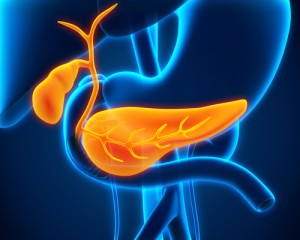CF Drug For Exocrine Pancreatic Insufficiency Shown To Be Safe, Effective In New Study
Written by |

 The majority of patients suffering from cystic fibrosis (between 80-90% of the patient population) are affected by exocrine pancreatic insufficiency (EPI), a condition usually present at birth and commonly diagnosed within their first year of life. However, a new experimental therapy for the condition has shown to be both safe and effective in a recent study.
The majority of patients suffering from cystic fibrosis (between 80-90% of the patient population) are affected by exocrine pancreatic insufficiency (EPI), a condition usually present at birth and commonly diagnosed within their first year of life. However, a new experimental therapy for the condition has shown to be both safe and effective in a recent study.
EPI results in the maldigestion of food and malabsorption of nutrients, leading to malnutrition, poor weight gain, steatorrhea and abdominal pain. Early diagnosis of cystic fibrosis and treatment of EPI with pancreatic enzyme replacement therapy (PERT) are vital, since adequate nutrition and normal growth are associated with better pulmonary function, fewer complications, and increased survival in patients with cystic fibrosis.
According to a recent post on the Cystic Fibrosis Journal, a team of researchers from Abbot Laboratories designed a 3-month, open-label, multicenter study in Russia assessing safety, efficacy, and ease-of-use of Creon® Micro (5000 lipase units/spoon) in children aged 1 month to 4 years with EPI due to cystic fibrosis.
[adrotate group=”1″]
Creon® Micro is a PERT indicated for the treatment of EPI due to cystic fibrosis consisting of gastro-resistant granules composed of 60.12 mg of pancreatin alongside different pancreatic enzymes, with previous clinical trials demonstrating the safety and efficacy of Creon® Micro in infants and young children.
 For this clinical study, cystic fibrosis was confirmed by pilocarpine iontophoresis (chloride concentration ≥60 mmol/L) or sweat conductivity testing, and EPI was determined by a faecal elastase-1 level <100 μg/g stool. Subjects were also required to have a body weight of at least 2 kg and a clinically stable condition without evidence of acute respiratory disease or any other acute condition. Efficacy was evaluated by assessing the growth parameters of height/length and body weight at baseline, Month 1, and Month 3.
For this clinical study, cystic fibrosis was confirmed by pilocarpine iontophoresis (chloride concentration ≥60 mmol/L) or sweat conductivity testing, and EPI was determined by a faecal elastase-1 level <100 μg/g stool. Subjects were also required to have a body weight of at least 2 kg and a clinically stable condition without evidence of acute respiratory disease or any other acute condition. Efficacy was evaluated by assessing the growth parameters of height/length and body weight at baseline, Month 1, and Month 3.
All 40 subjects completed treatment, with adverse events observed in 40% of the patients, including respiratory tract infections [15%], frequent bowel movements [8%], rhinitis, stomatitis, nasopharyngitis, and diarrhoea [all 5%]. However, none of these side effects were considered serious or resulted in cessation of treatment. Regarding efficacy, after 3 months subjects aged <2 years displayed an increase in height, weight, and height/weight-for-age and subjects aged 2–3 years also showed an increase in these growth parameters, as well as BMI-for-age, although the increases were smaller than in the younger age group. Furthermore, the treatment was rated ‘easy’ to administer by 95% of caregivers and acceptance was determined ‘good’/‘very good’ by 90% of them.
The data from this clinical study indicates that Creon ® Micro is well tolerated with a favorable safety profile when administered at recommended doses, strengthening the growing evidence that Creon is an effective treatment of EPI with a consistent safety profile.






